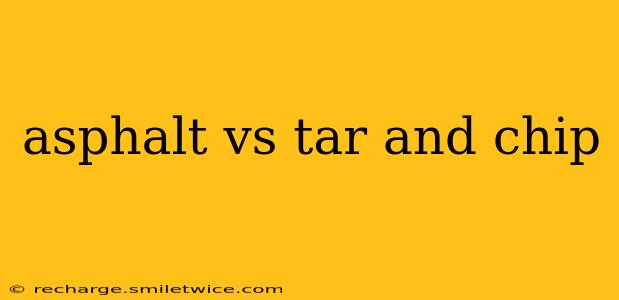Choosing the right road surface for your driveway, parking lot, or roadway depends on a variety of factors, including budget, traffic volume, aesthetic preferences, and climate. Two popular options often get compared: asphalt and tar and chip. While both use petroleum-based materials, they differ significantly in their composition, application, lifespan, and overall cost. This comprehensive guide will delve into the key differences to help you make an informed decision.
What is Asphalt?
Asphalt, also known as asphalt concrete, is a composite material composed of aggregates (like crushed stone, sand, and gravel) bound together by bitumen, a viscous black petroleum product. The mixture is heated and laid down in layers, compacted to create a smooth, durable surface. Asphalt is known for its relatively smooth finish and its ability to withstand moderate to heavy traffic loads. It’s the most common paving material used for roads, driveways, and parking lots.
What is Tar and Chip?
Tar and chip, sometimes called chip seal, is a less expensive paving alternative that involves applying a layer of hot asphalt emulsion (the "tar") over an existing surface, then embedding small stones ("chips") into the emulsion. A roller compacts the chips, ensuring they adhere firmly. Once the process is completed, the excess chips are swept away. This creates a textured surface, often with a rustic appearance.
Asphalt vs. Tar and Chip: A Detailed Comparison
Here's a head-to-head comparison of asphalt and tar and chip across several key aspects:
Cost:
- Asphalt: Generally more expensive upfront due to the higher material costs and more complex installation process.
- Tar and Chip: Significantly less expensive than asphalt paving, making it a budget-friendly choice, especially for smaller areas.
Durability and Lifespan:
- Asphalt: More durable and longer-lasting, with a lifespan of 15-20 years or more, depending on maintenance and traffic conditions.
- Tar and Chip: Less durable and shorter-lasting, typically lasting 3-5 years before needing resealing or replacement. It's more susceptible to cracking and damage from heavy traffic.
Maintenance:
- Asphalt: Requires regular sealing every few years to prevent cracking and extend its lifespan. Potholes may need to be repaired.
- Tar and Chip: Requires resealing more frequently, usually every 2-3 years. The loose chips can cause some inconvenience and may need occasional sweeping.
Appearance:
- Asphalt: Provides a smooth, uniform, and visually appealing surface in black or dark gray.
- Tar and Chip: Has a more rustic, textured appearance. The exposed chips create a less uniform look. The color will vary depending on the stone used.
Application and Installation:
- Asphalt: Requires specialized equipment and skilled labor for proper installation and compaction.
- Tar and Chip: Simpler installation process, potentially leading to faster project completion times.
Noise Level:
- Asphalt: Generally quieter than tar and chip surfaces.
- Tar and Chip: Can be noisy due to the textured surface and the loose nature of the stones.
Which is Right for You?
The best choice between asphalt and tar and chip depends heavily on your specific needs and priorities:
-
Choose asphalt if: You need a durable, long-lasting surface that can withstand heavy traffic, you prioritize a smooth, aesthetically pleasing finish, and budget isn't a primary concern.
-
Choose tar and chip if: You're on a tight budget, you're looking for a quick and relatively simple paving solution, and you prefer a rustic, textured appearance. This is often suitable for low-traffic areas like driveways or secondary roads.
Frequently Asked Questions (FAQs)
Is tar and chip suitable for heavy traffic areas?
No, tar and chip is not recommended for areas with heavy traffic. Its relatively short lifespan and susceptibility to damage make it unsuitable for roads or parking lots that experience significant vehicle volume.
How long does asphalt last?
With proper maintenance, asphalt paving can last for 15-20 years or even longer.
What is the best way to maintain tar and chip?
Regular resealing every 2-3 years is crucial for maintaining the integrity of a tar and chip surface. Regular sweeping helps remove loose stones.
Is asphalt environmentally friendly?
While asphalt itself is not inherently environmentally friendly due to its petroleum base, efforts are being made to develop more sustainable options and improve its overall environmental impact.
Can I use tar and chip on my driveway?
Yes, you can use tar and chip on your driveway, particularly if it's a low-traffic area and you're prioritizing budget. However, be aware of its shorter lifespan.
By carefully weighing the pros and cons of asphalt versus tar and chip, you can choose the paving solution that best suits your specific requirements and budget. Remember to consult with a paving professional to get personalized advice based on your site conditions and project needs.
